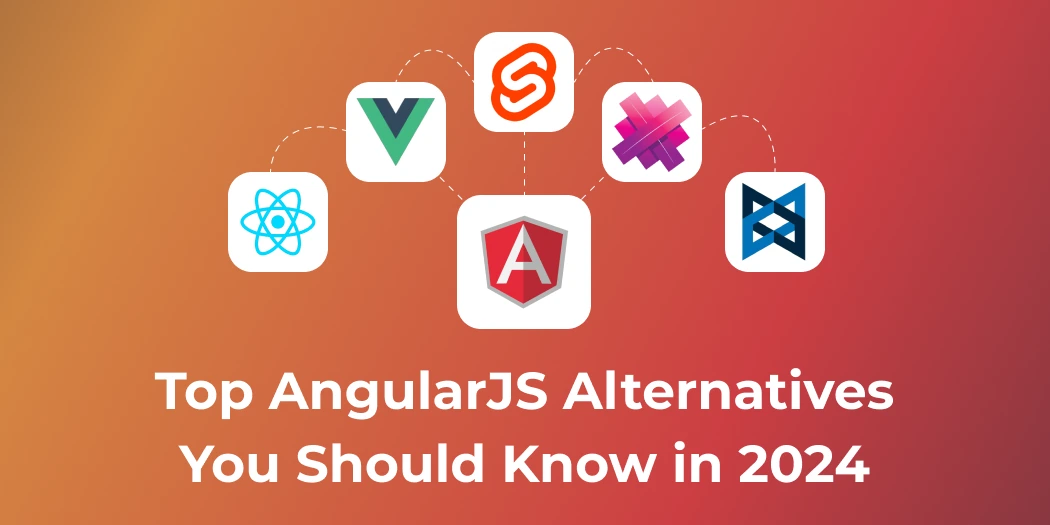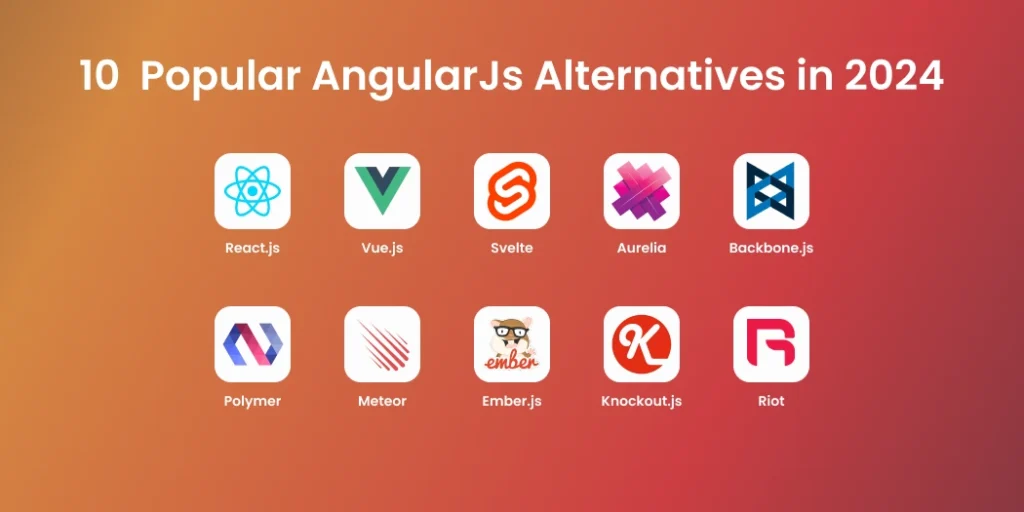Role of Python Libraries in Image Processing
October 30, 2025
Home >> AngularJS >> Top AngularJS Alternatives You Should Know in 2024

Quick Summary
More than 300,000 sites have opted for AngularJS, among which YouTube, Google, and PayPal. Despite this popularity, though, AngularJS has several drawbacks that make most developers seek another framework rather than stay with this one. In 2024, there are quite several strong alternatives offering well-defined advantages to enhance your development process. While choosing an alternative to AngularJS, you could consider what is essential to the success of your project: optimization, state management, development tools, and community support. Here in this guide are the top alternatives for AngularJS, promising better performance and greater flexibility with innovative features to help you get a more streamlined workflow and enriched web development experience. Websites that use AngularJS have benefited from its capabilities, but understanding these alternatives can significantly improve your project’s outcomes.
There are several reasons to consider looking for AngularJS alternatives, especially as the web development landscape evolves. Here are some key factors:
AngularJS was officially deprecated, meaning no new features or major updates will be released. Without continued support, using AngularJS may lead to security vulnerabilities and compatibility issues with newer technologies.
Although AngularJs is very flexible, new alternatives such as React and Vue.js offer performance improvements especially when dealing with complex or large applications. These frameworks have optimized rendering and user experience to improve smoothness.
Web development has shifted towards more efficient architectures and tools. Micro Frontends Architecture has emerged as a leading approach, allowing teams to break down complex applications into smaller, manageable components. Alternatives to AngularJS now come with modern features like component-based architectures, better state management, and improved development environments, all of which allow for cleaner, more maintainable code.
React Native and Svelte make mobile development easier because they natively support cross-platform app creation. If your project uses mobile apps, then AngularJS might not be the best alternative compared to other options.
AngularJS is a bit of a pain to learn for a new developer to start to use, especially when compared to a newer package, such as Vue.js or Svelte, which have simpler syntaxes and are easier to get started.
Many AngularJS alternatives have far more expansive ecosystems and better tooling. To give one example, React contains an enormous library of reusable components and tools that speed up the development process themselves. This enables developers to find many pre-built solutions for common problems and therefore shorten their time spent coding.
Moving into newer frameworks allows you to benefit from performing even better, developer experiences being improved, and entry into the growing community and the ecosystem.

If you’re on the hunt for fantastic alternatives to AngularJS, we’ve put together a list of ten top-notch options for your next web development project:
Why Choose React?
React has become truly popular since Facebook launched it in 2013. It was initially created to build user interfaces; today, it has emerged as a major player in this front-end world where fast construction of functional, user-friendly, and visually acceptable websites happens.
Key Features:
Why Choose Vue?
Vue.js has become one of the go-to JavaScript libraries since its debut in 2013. It’s particularly loved for its efficiency in creating user interfaces and single-page applications. Its unique adaptability makes it a breeze to integrate into existing projects.
Key Features:
Why Choose Svelte?
Svelte is a fresh take on building user interfaces that sets itself apart. Instead of using a virtual DOM like many traditional frameworks, Svelte compiles your code at build time. You get lean, efficient JavaScript that runs directly in the browser, leading to faster performance and a smoother development experience.
Key Features:
Why Choose Aurelia?
This is a newer framework for JavaScript, and it is famous for its modular architecture. It can make the powerful building of web, desktop, and mobile applications strictly in observance of the open web standard.
Key Features:
Why Choose Backbone?
If you have worked with JavaScript, you must have worked with Backbone. This lightweight library simplifies the procedure for developing single-page applications based on the MVC model of the pattern for enabling efficient communication between a server and a client.
Key Features:
Why Choose Polymer?
Polymer is the open-source library developed by Google back in 2015, particularly for building applications based on web components. In this way, developers can create custom elements to improve the functionality of web applications.
Key Features:
Why Choose Meteor?
Meteor is a full-stacked JavaScript framework that brings a wide array of libraries to web and mobile app development. It ranks among the best alternatives to AngularJS.
Key Features:
Each one of these has some strength coming into play, so one of these will suit your needs for your project. If you want ease, performance, or flexibility, something here can help in your development.
Why Choose Ember?
Ember.js has existed since December of 2011 as an open-source JavaScript web framework and one trusted by the world’s largest companies, such as LinkedIn, Twitch, and Apple Music, to build applications. Ember.js acts as a solid alternative to Angular as it enables developers to create web applications on a scalable level using common idioms and practices based upon running on the Model-View-ViewModel architecture.
Key Features:
Why Choose Knockout?
This open-source JavaScript library was first launched in 2010 and ensures smooth running across all major browsers, with its core built on the MVVM pattern of Knockout, thus making it easier for developers to create responsive websites that react to user input.
Key Features:
Why Choose Riot?
Riot is an open-source, multi-architecture network operating system developed by developers, researchers, and hobbyists. It is optimized for IoT devices and supports a wide range of microcontroller architectures. Finally, riot emphasizes connectivity, security, privacy, and robustness, so it is a very reliable implementation for the high-tech application.
Key Features:
These alternatives each bring unique features and strengths to the table, providing developers with a variety of tools to enhance their web development experience. Whether you’re building a simple project or a large-scale application, there’s an option here that can suit your needs.
When it comes to application development, AngularJS is often hailed as one of the most promising JavaScript frameworks. Its robust features make it a favorite among developers, but there are areas where other frameworks might shine brighter.
Factors to Consider
Selecting the right framework for your web and mobile app development requires careful thought. Key factors include:
Comparing AngularJS Alternatives
As you explore alternatives to AngularJS, it’s vital to compare them on several fronts. Look at availability, toolsets, libraries, versatility, efficiency, and functionalities. By understanding these elements, you can make an informed choice that sets your project up for success.
Feel free to reach out to us if you are confused or have some questions. Our experts, from the top-rated AngularJS development company Tagline Infotech, are here to help you. With our experience, we can guide you toward the best solution suitable for your project’s needs. Hire AngularJS developers now from Tagline Infotech and take your application development to the next level!
Explore these alternatives with AngularJS, and you will be better equipped for the best tools in your development experience. While many developers are very strict about using AngularJS, some incredible alternatives can lighten up your workflow and help you build awesome websites in no time. All this boils down to proper alternatives and updates about the latest developments.
Remember, choosing a good framework is half the work done, but for the same reason, having a skilled development team is very important. If you are seeking advice to hire AngularJS developers, please feel free to contact us! As one of the leading AngularJS development companies in the industry, Tagline Infotech is here to help you find and guide the right talent for moving your projects to great heights.
Absolutely! Angular is still used by a mass of developers in 2024. Powerful functionality, good documentation, and a wide community make it a reliable solution for most web development projects.
The framework Angular (more commonly referred to as Angular 2+) is considered the direct follow-up of AngularJS. It provides better performance and a more streamlined process compared with its predecessor.
AngularJS is officially deprecated, but still extensively used on many older applications. It is not the first choice for new projects, but in maintaining legacy systems, migration to Angular or other modern frameworks must be considered.
Google started AngularJS but later shifted its focus to Angular (Angular 2+). AngularJS is in maintenance mode, where only necessary updates will be provided, and no new features.

Digital Valley, 423, Apple Square, beside Lajamni Chowk, Mota Varachha, Surat, Gujarat 394101
D-401, titanium city center, 100 feet anand nagar road, Ahmedabad-380015
+91 9913 808 2851133 Sampley Ln Leander, Texas, 78641
52 Godalming Avenue, wallington, London - SM6 8NW